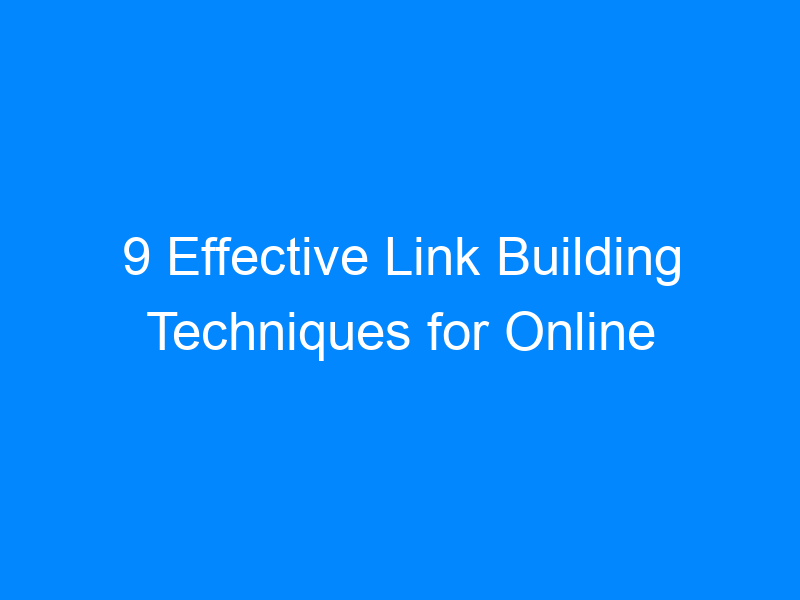Higher organic ranking in search results is important for every e-commerce company, and creating links is a powerful way to achieve this. With the ever-changing SEO world, small and medium-sized online companies face tough competition to make a big name for themselves.
SEO is a platform that can be found on nearly any website. For instance, link building is an SEO technique that everyone can reap the benefits of ranking higher on Google’s search engine.
Link building for e-commerce can be fast and efficient; all you need is the correct strategies and good targets. Just go through this article where we’re giving you ten techniques that will help you survive and succeed in the digital marketplace. If you’re a low-time but enthusiastic eCommerce company owner, that’s what you need. Be prepared to be a link building master and knock any of the other pages down the search rankings.
While most cannot afford a costly SEO service to make their websites grow, link building is effective but mostly fully used by these companies.
What is link building?
Link Building is the method of obtaining hyperlinks from other sites and connecting them to your website. A hyperlink is a gateway that helps people to connect through various locations on the Internet. Search engines like Google choose such links to crawl across the gazillions of websites on the internet. Search engines are doing this by finding new web pages, gathering data on websites, defining their rankings in the search results.
Let’s check out ten powerful link building techniques that most e-commerce websites can use to boost business scope and progress.
- Reserve a column for blog
Creating a blog section on your web page helps you to post material that is deserving of being linked. Your content can be news, information, trends, and helpful information. Get in contact with business influencers and bloggers, then inform everyone about your amazing stuff. - Evaluate your competitors’ links
You may use methods to execute backlinks report on competitors to review which places they are getting links from. There is a range of super resources, like Ahref, Majestic, or OSE, that render this task simple. You can check for links from bloggers, vendors, or related industry pages that you can duplicate and add to your website. - Use video ads
Today, video is a trend for presenting details. It brings the product to life with guides, tutorials, storylines, and vlogs. It succeeds and it’s convenient to share what viewers wish to see. Visual objects are difficult to distribute without being attributed to the owner or the maker. If anyone posts or embeds your video, you can email us to request a link back to your actual site. - Make your products interesting
The secret to this approach is to make your goods interesting to prospective buyers and to create a consistent path to traffic on your web. You can drive traffic to your website with creativity. Consider making exciting features that are worth discussing, such as free-to-use images or valuable technologies. - Build a community
Your consumers are also the best providers of new links. The rewards of creating a community across the world easily surpass SEO. Global companies use the group to cultivate loyal audiences and link welcomed goods. Communities take time and commitment to be built, but as they’re growing, they’re a useful source for more links. The most successful strategies are sometimes not simple or fast, but very inexpensive. - Link to the content of influencers
Currently, most people do not like brand advertising, so creating links with your networking will result in a low level of interaction. However, you can overcome this by supporting and connecting the brand to influencers. People are going to be able to help the people they love. Start allowing influencers to post media using your goods and create backlinks to your site, which draws a range of organic referring links. - Reach out to guest blog
Guest blogging is a method of reaching out to various sites to find if they can post the stuff you’re posting on their pages. If you are willing to generate high-quality content, several reputable sites will happily welcome your guest blogs and connect back to your web. - Make a Frequently Asked Questions page
If you waste time browsing Google, Quora, Yahoo! Answers, etc., you’ll be able to get more than 100 FAQs. Jot down some 20 frequently asked questions (FAQs) about your niche audience. People are going to be able to pass your answers in new links. Try adding photos, videos, and links to the subject. You have to get the FAQs as nice as possible to be effective.
Attempt to be controversial
Avoiding risks isn’t going to lead you anywhere in a fiercely competitive internet world. Controversy will help if you wish to stand out from the competitors. Brainstorm business-related issues that can cause audiences to read your content.




